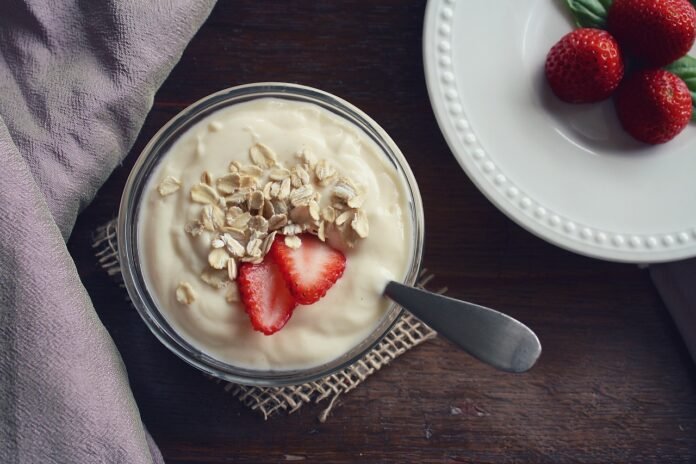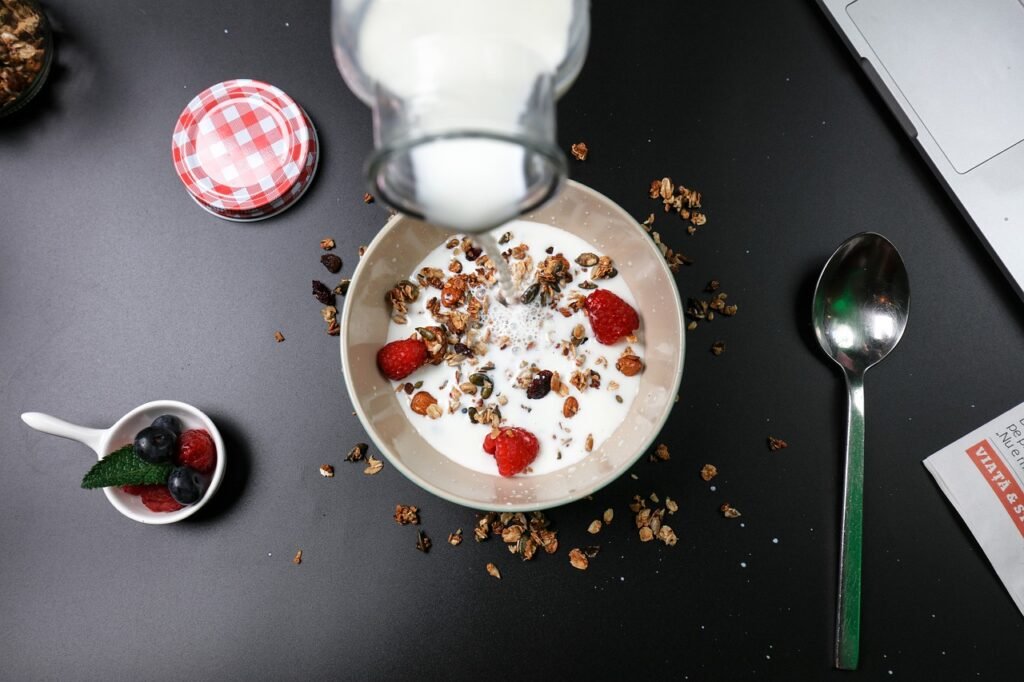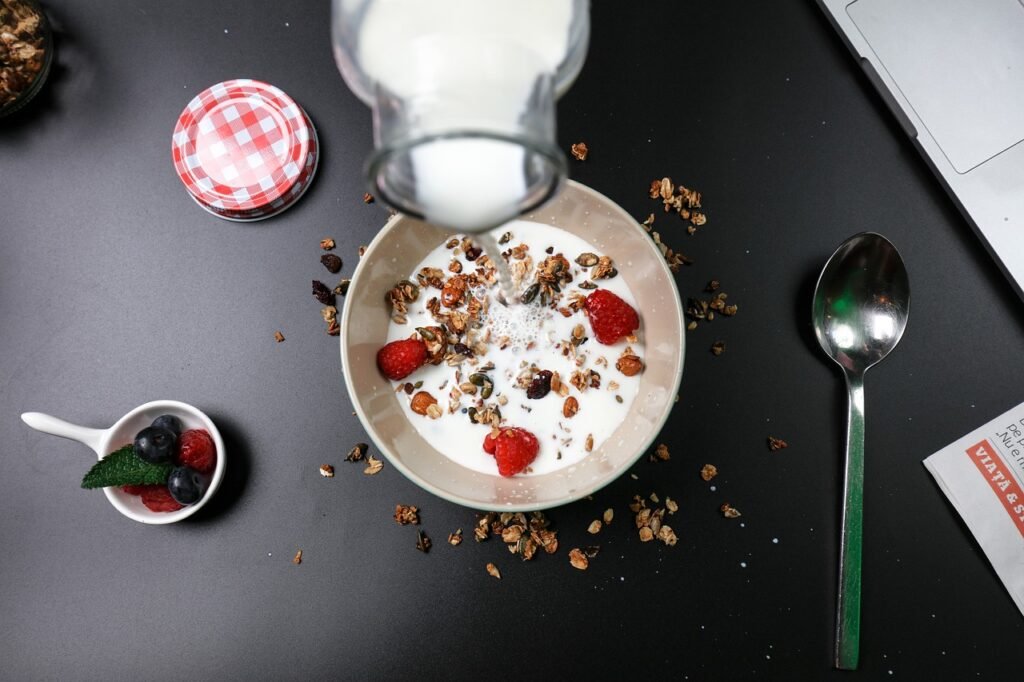Nutritional Breakdown: What Makes Yogurt a Skin Super food?
Yogurt is a remarkable dairy product that serves as a powerhouse of nutrients beneficial for skin health. At the core of its skin-enhancing properties are Probiotics, which are live bacteria that promote a healthy microbiome. These Probiotics contribute to skin barrier role, enhancing moisture retention, and reducing inflammation. Beneficial bacteria help balance the skin’s natural flora. This balance can lead to a clearer and more radiant complexion.
Yogurt holds Probiotics, and it is rich in essential vitamins. It is particularly high in B vitamins like riboflavin, niacin, and B12. It also has vitamin D. B vitamins play a crucial role in cellular metabolism and are known to promote healthy skin cell turnover. Vitamin D is significant for immune role. It help in reducing skin conditions like acne and psoriasis. This is achieved by regulating inflammatory responses. The vitamins in yogurt not only nourish the skin from within but also enhance its ability to repair and rejuvenate.
Another important part found in yogurt is lactic acid, an alpha hydro’s acid (AHA) known for its exfoliating properties. Lactic acid aids in dead skin cell removal, promoting a smoother skin texture and improved hydration levels. This gentle exfoliation reveals fresher skin underneath, resulting in a brightened appearance over time. Moreover, yogurt is a source of vital minerals. These minerals include calcium and potassium. They help in maintaining skin elasticity and moisture balance.
On a cellular level, these nutrients work synergistically to enhance the overall health and appearance of the skin. Yogurt provides hydration. It promotes collagen production. It also aids in cell regeneration. These actions can significantly contribute to achieving a youthful glow and a more even skin tone. Yogurt has a diverse nutrient profile. This makes it a skin super food. It can be easily integrated into a daily skincare regimen.
Hydration and Moisture Retention: Yogurt as a Natural Moisturizer
Yogurt serves as a remarkable natural moisturizer, primarily due to its high water content and the presence of lactic acid. Lactic acid, an alpha hydro’s acid, plays a pivotal role in gently exfoliating the skin. This beneficial part helps to remove dead skin cells, revealing a fresher, more radiant layer underneath. By removing these surface cells, the skin becomes more receptive to moisture, enhancing its overall hydration levels. This process is especially helpful for those with dry or dehydrated skin. It aids the skin’s ability to keep essential moisture.
Furthermore, yogurt holds a variety of nutrients, including vitamins B2 and B12, which are known for their skin-nourishing properties. These vitamins not only help to hydrate the skin but also contribute to improving its elasticity and overall texture. The natural fats found in yogurt help create a protective barrier on the skin. They seal in moisture and prevent transepidermal water loss. This creates an optimal environment for maintaining hydration throughout the day.
For those seeking to harness the hydrating benefits of yogurt, DIY yogurt masks offer a simple and effective solution. Mixing yogurt with honey, for instance, can enhance its moisturizing effects while providing extra antibacterial properties. Another popular combination includes blending yogurt with avocado. It is known for its hydrating fats. This creates a creamy mask that deeply nourishes the skin. Apply these natural yogurt-based masks for 15-20 minutes. This time allows the skin to absorb the beneficial nutrients. The result is a plumper, more hydrated complexion.
In conclusion, using yogurt as a natural moisturizer provides essential hydration. It also promotes healthy skin renewal through gentle exfoliation. By incorporating yogurt into skincare routines, individuals can significantly improve their skin’s moisture retention, ensuring a supple and vibrant appearance.
Soothing Inflammation: Yogurt’s Role in Acne and Skin Irritations Best Remedy for your Skin
Yogurt has emerged as a compelling ally in the quest for healthy skin. It is particularly beneficial for those grappling with acne and various skin irritations. Yogurt has anti-inflammatory properties that soothe inflammation and redness. This is primarily due to its rich Probiotics content. Probiotics are the beneficial bacteria found in yogurt. They are known to promote a balanced skin microbiome. They also combat harmful pathogens that contribute to skin flaws.
When applied topically, yogurt’s cooling effect can alleviate discomfort linked with inflamed skin. This natural remedy provides a gentle approach to addressing acne flare-ups. It also helps with other irritations. This makes it suitable for sensitive skin types. Many individuals have reported noticeable improvements in their skin conditions after integrating yogurt into their skincare routines. For instance, case studies show that users have experienced reduced redness. Swelling is also minimized after the application of yogurt masks or compresses. This demonstrates its efficacy as a soothing agent.
Additionally, the presence of lactic acid in yogurt acts as a mild defoliant. It helps to clear away dead skin cells. These cells often contribute to clogged pores and aggravate acne. Calming inflammation and promoting skin renewal are dual actions. These actions make yogurt an appealing choice for those seeking natural solutions to skincare challenges. Testimonials from individuals highlight the physical changes observed. They also mention an increased sense of well-being as their skin becomes calmer and more balanced.
In summary, yogurt’s role in addressing acne and skin irritations can’t be overlooked. The evidence supporting its anti-inflammatory effects, along with real-life experiences, underscores the potential benefits of incorporating yogurt into skincare regimens. As more people discover these advantages, yogurt strengthens its reputation. It is a powerful tool in fostering healthy, radiant skin.
Incorporating Yogurt into Your Skincare Routine: Tips and Recipes
Integrating yogurt into your skincare regimen can be both simple and rewarding. Yogurt is rich in Probiotics, vitamins, and lactic acid, all of which contribute to healthier skin. To start, it is essential to select the right type of yogurt for your skincare needs. Opt for plain, unsweetened yogurt, preferably organic, to avoid any harmful additives. Greek yogurt is particularly beneficial due to its thicker consistency and higher protein content.
One of the simplest ways to incorporate yogurt into your routine is through homemade masks. To create a basic yogurt mask, apply a thin layer of yogurt directly to your face. Leave it on for 15-20 minutes before rinsing with lukewarm water. This mask hydrates the skin while providing gentle exfoliation, leaving it feeling fresh and rejuvenated. For enhanced benefits, consider mixing yogurt with other natural ingredients. For instance, adding honey can boost moisture levels, and incorporating turmeric can help combat inflammation.
Another effective method is to create yogurt scrubs. For a gentle defoliant, mix equal parts of yogurt and ground oats. This combination not only helps remove dead skin cells. It also nourishes the skin. This makes it ideal for sensitive skin types. Applying this scrub 1-2 times a week can promote a smoother and brighter complexion.
Additionally, yogurt can be used as a treatment for specific skin concerns. For example, to tackle acne, combine yogurt with a few drops of tea tree oil for its antibacterial properties. For dry skin, a mixture of yogurt and avocado can offer deep nourishment. Remember to store any unused yogurt masks in the refrigerator and use them within a week for optimal freshness. By seamlessly incorporating yogurt into your skincare routine, you can unlock its incredible benefits, promoting healthy and vibrant skin.




